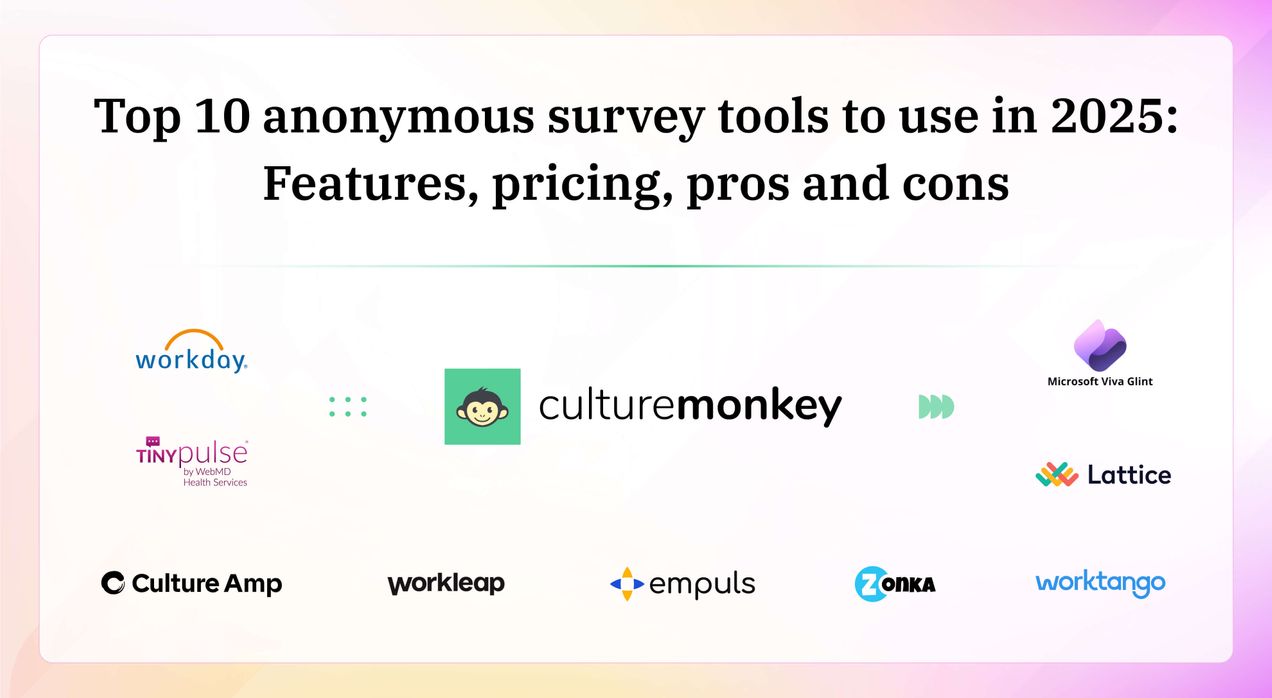Effects of anonymity on honesty in employee surveys

Samantha had just joined a multinational company (MNC) as an HR professional two months back. This was her dream job—the industry she wanted to work in, the company culture seemed great, the salary was what she wanted, and the office was just thirty minutes away from her place. This was exactly what she had been looking for, these past few years. The company she recently joined was a step up from the startups she had been previously working at.
And of course, this MNC brought along quite a few changes to her career but this was expected. There’s no growth without challenges after all. And Samantha strongly believed this. She knew it would take her a few months to adjust to the company’s culture and align with its goals. So she worked towards understanding the company better and putting more effort.
Being an HR professional, her job required her to understand people and see them as people first rather than mere resources. In her journey to getting to know her colleagues better, she tried opening up to them but wasn't met with a warm response. She knew the corporate culture was much different than the culture at a startup. Since she had to deal with just people, she thought it wouldn't be so hard.
Her lunch conversations were mostly a hit and miss. Everyone tried to dodge questions when it came to the management or to bring in changes. It was as if there was a big divide between the management and the workforce. Neither group was interested in the other. This indifference led to tensions brewing in the company.
It soon became apparent to Samantha that there was an unspoken rule of never speaking until asked to. Yes, there were many office events and collaboration activities but they were limited to forced participation rather than voluntary participation in the activities.
Soon, Samantha began noticing signs of both major and minor problems across the company, at all levels. The company was not doing as well as it was supposed to and talent retention was a major problem.
She realized that the lack of communication and the absence of camaraderie was to be blamed here. The company was filled with mini-groups and no one felt the need to go beyond their immediate job role. In fact, it was frowned upon. The entire company was built on age-old traditions where the bosses had the last word, be it right or wrong.
Samantha was wondering what she could do to improve the situation. Most of the members of the HR team had been in the company for quite a few years and they were a part of the company culture—never seeing the need for any changes. Samantha truly felt alone in this uphill battle where the company’s success relied on one factor—communication.
She tried her best to introduce new, inclusive policies and encourage communication and collaboration, but, she was repeatedly belittled. Her dream job was soon turning into a never-ending nightmare and before long, she ended up resigning. Two years down the line, the company filed for bankruptcy.
Communication is the key

Communication is regarded as one of the most important factors of any company’s growth. How else are employees supposed to collaborate and grow without communicating? Communication comes in different forms, and one has to be open towards them—this involves both verbal and non-verbal communication.
Most leaders know the importance of communication in a company. They are aware that without communication, no true growth can happen. Yet we see companies struggling with it.
In 2018, Arthur J. Gallagher and Co. reported that 60 percent of companies don’t have any internal communication strategy. The study also reported that almost half of the respondents wanted to improve leadership communication yet there was nothing in place to do so.
This situation got worse during the pandemic when most of the world’s workforce was pushed to start working remotely. Without the right communication strategies in place, companies suffered a great deal. Communication within a company is much easier when everyone is in the same physical location but it becomes extremely difficult when every employee is spread across geographically.
While working remotely, most employees have been working in silos and the camaraderie between employees has decreased to a great extent. At times like these, companies need to pay close attention to know what’s actually going on in the minds of the employees and how the problems can be improved.
Communicate honestly
A one-on-one conversation between a manager and a team member is often seen as the best approach to understand the personality of an employee. However, such conversations are not always honest. Most employees tend to refrain from being authentic in a face-to-face situation. This image they maintain mainly stems from the fear of consequences—employees are scared that if they get too honest with their leaders and point out all the wrong things in the company and the changes needed, they might suffer the brunt of it.
Such feedback cannot be blamed on the employee but the company culture. It is because the company failed to create a culture of empathy and proper communication that employees are forced to put up a facade always. After all, they value their jobs.
In order to combat this, companies must think outside the box. They can rely on employee engagement tools that will help establish the right feedback mechanism. This is possible through anonymous employee surveys that help employees communicate with the management without any fear of consequences.
Scale your company with action-oriented feedback
Anonymous feedback surveys help establish honest communication channels within the company which in turn steers the company in the direction of success. The main objective of employee feedback is to listen, engage, and act. Anonymous employee surveys help companies do that.
This is where CultureMonkey understands the need for honest communication in a company and has incorporated the listen, engage, and act pillars in their employee engagement platform. Anonymous employee feedback surveys help companies in the following ways:
- Each employee has the right to voice their opinion

A company consists of different people, where some are confident enough to express their opinions openly, while it's harder for others to do so. Many times, the shy ones end up staying quiet even if they might have relevant feedback to offer to the management. In such cases, an anonymous employee survey comes to the rescue. Such surveys are designed to empower every employee within the organization by giving them the right, unbiased platform to express what they think honestly.
- Improve employee tenure
When employees see that their leaders are interested in what they have to say, they feel respected and heard. This creates a culture of trust in the company. Employees are more likely to stay longer in companies where they are heard because, at the end of the day, employees leave managers, not companies.
- Tangible data for the management
Anonymous employee surveys help employees give their honest opinion which helps management gain accurate insights and turn it into actionable data. Employees get to speak their minds, and this gives leaders a real picture of how things stand within the company, thus, helping them take the right action to improve the employee experience in the company.
It is important to show that the employees’ experience with the company matters and anonymous employee surveys help leaders understand what matters to their employees to take the right steps.



